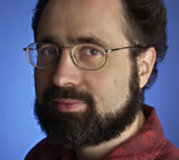Presentation: "Energy-efficient Cloud Computing"
Time: Monday 17:30 - 18:15
Location: Store Sal
Presentation: "Energy-efficient Cloud Computing"Time: Monday 17:30 - 18:15 Location: Store Sal
Abstract: As computation continues to move into the cloud, the computing platform of interest no longer resembles a pizza box or a refrigerator, but a warehouse full of computers. Large portions of the hardware and software resources in these facilities must work in concert to efficiently deliver high levels of Internet service performance. In this talk I'll discuss how we made Google's infrastructure scalable, cost effective, and energy efficient, to the point where your desktop PC is using more energy while you're typing a query than Google uses to answer it.
Download slides
|
Urs Hölzle, One of Google's first ten employees, Senior Vice President of Operations, Google
Urs Hölzle served as the company's first vice president of engineering and led the development of Google's technical infrastructure. His current responsibilities include the design and operation of the servers, networks and datacenters that power Google. He is also renowned for both his red socks and his free-range Leonberger, Yoshka (Google's top dog). Urs joined Google from the University of California, Santa Barbara where he was an associate professor of computer science. He received a master's degree in computer science from ETH Zurich in 1988 and was awarded a Fulbright scholarship that same year. In 1994, he earned a Ph.D. from Stanford University, where his research focused on programming languages and their efficient implementation. As one of the pioneers of dynamic compilation, also known as "just-in-time compilation," Urs invented fundamental techniques used in most of today's leading Java compilers. Before joining Google, Urs was a co-founder of Animorphic Systems, which developed compilers for Smalltalk and Java. After Sun Microsystems acquired Animorphic Systems in 1997, he helped build Javasoft's high-performance Hotspot Java compiler. In 1996, Urs received a CAREER award from the National Science Foundation for his work on high-performance implementations of object-oriented languages. He was also a leading contributor to DARPA's National Compiler Infrastructure project. Urs has served on program committees for major conferences in the field of programming language implementation, and is the author of numerous scientific papers and U.S. patents. |
 |
||